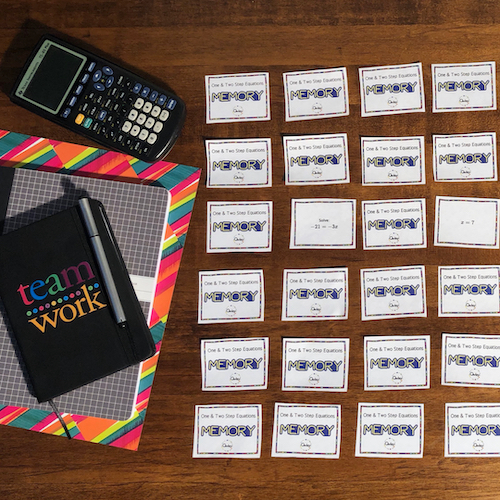Boosting Math Retention with Memory Games: How Retrieval Practice Helps Students Learn and Remember


Are you looking for a fun and effective way to help your students retain mathematical concepts? Look no further than the classic game of Memory! This simple game can be a valuable tool for reinforcing learning and promoting student engagement.
One of the main benefits of playing Memory in a math class is that it provides an opportunity for students to engage in retrieval practice. Retrieval practice is a technique where students recall information from memory, which has been shown to improve long-term retention of the material (1). As students match pairs of cards, they are reinforcing the connections between mathematical concepts and solidifying their understanding.
Another benefit of playing Memory in a math class is that it can be used to review a wide range of mathematical concepts. For example, you could create cards with algebraic equations and their solutions, geometric shapes and their properties, or even graphs of functions and their equations. This versatility makes Memory a flexible tool that can be used to reinforce a variety of different concepts.
Playing Memory can also be a fun and engaging way to review material and keep students interested in the learning process. As students become more involved in the game, they may become more invested in the material being reviewed and more likely to retain the information over time.
Research has shown that retrieval practice, such as playing Memory, can significantly improve long-term retention of the material (2). In one study, students who engaged in retrieval practice after a week were able to recall significantly more information than those who reviewed the material using other methods (3). By incorporating Memory into your math classroom, you can help your students retain mathematical concepts and improve their performance on assessments.
Incorporating Memory into your math classroom is easy and can be adapted to suit your specific needs. You can create your own Memory cards using a variety of online resources or purchase pre-made cards from Qwizy's TPT store. Qwizy's Memory Card Sets include 5 different versions of 15 questions each for teachers to utilize in their classrooms as they see fit.
In conclusion, playing Memory in a math classroom is a simple yet effective way to help your students retain mathematical concepts. With its ability to engage students in retrieval practice and reinforce a variety of different concepts, Memory can be a valuable addition to any math teacher's toolbox.
Sources: